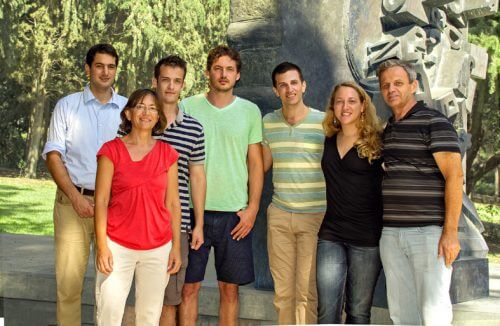Dr. Yachin Evri, the Technion's first winner of the Zuckerman scholarship, develops nanometric materials with unique properties

Dr. Yachin Evari joined the ranks of the Technion about a year ago as a faculty member in the Faculty of Materials Science and Engineering, and since then he has been devoting a significant portion of his time to forming his research group in the faculty. According to him, "It's a great and interesting process, full of interactions that require you to be involved and understand things very deeply. To my delight, we have already achieved interesting results, and some of them are in the final stages of scientific publications."
Dr. Evari, who completed a doctorate at the University of Cambridge and a post-doctorate at MIT, returned to Israel with the assistance of the Zuckerman scholarship (see left). Now, in addition to his faculty appointment, he is a member of the Solid State Institute, the Russell Berry Nanotechnology Institute (RBNI) and the Grand Energy Program. Today he lives with his family in the village of the well-off at the Technion and notes favorably the process of his and other faculty members at the Technion. "There is a dedicated and efficient system here that helps us and greatly softens the difficult process of returning to Israel."
He grew up in Jerusalem, studied at the Himmelfarb High School in the city and loved the Gemara studies very much. "I think these studies sharpen thinking and help develop logic patterns that also help in scientific research," he says. After military service in an elite unit, he began studying physics at the Hebrew University, where he also met his wife Avital, currently a postdoctoral student in chemistry and computational biology at McGill University in Canada.
An honors scholarship usually reserved for doctoral students led the two young students to Imperial College in London. According to him, "It was an excellent exposure to academia in the UK, and my supervisor recommended Cambridge to me." Indeed, after a master's degree in physics at the Weizmann Institute, Hebrew flew to Cambridge, where he completed a doctorate at the Center for Nanosciences and worked in the field of nanoferroelectricity. "Proelectricity is a built-in property of the material - electrical directionality - that can be reversed with the help of an external electric voltage, and I am investigating it at the nanometric levels of the material."
Collective response
In Cambridge, Ivri began to delve into the issue of collective reactions of the material to external stimuli. "In nanometric systems, the collective behavior of the material is of great significance - behavior that cannot be deduced from observing two or three particles. Just as it is impossible to characterize a grouping by two people or a quorum by three, so it is impossible to characterize functional nanoscale materials based on individual particles. The multiplicity of particles in a material has a very complex cumulative effect, so it is important to understand this phenomenon at a systemic level."
Mapping this collective behavior is a very complex task, which requires multidisciplinary research that combines science and application and between different fields such as physics and materials engineering. "That's why I found myself in the Faculty of Materials Science and Engineering, where real multidisciplinary research is conducted that sits at the intersection between physics, chemistry and materials engineering. It's a small and very diverse faculty that gives researchers a lot of independence."
functional materials
The basic research in the field, which Dr. Evri continues even today as a faculty member at the Technion, has far-reaching practical implications. This is because the characterization of functional materials and their control on a nanometer scale has a significant potential impact on the high-tech industry and other fields. Evri developed new superconductors - materials characterized by quantum behavior even at the microscopic level - which have significant technological advantages.
The young research group focuses on the issue of energy consumption by computers. "The meteoric increase in the amount of information that computers are required to store and process dramatically increases the power supplies consumed by computer systems, especially servers, and accelerates the heating of the device itself (the computer). This matter is becoming a global problem that requires a serious solution."
Ivri believes that "the material is the machine", therefore a change in the materials used in the world of computing may lead to a drastic reduction in the required power. "The functional materials I am developing are characterized by high energy efficiency, so I estimate that in this field too we can be partners in a very dramatic change - what a billion transistors do today, only fifty will do."
